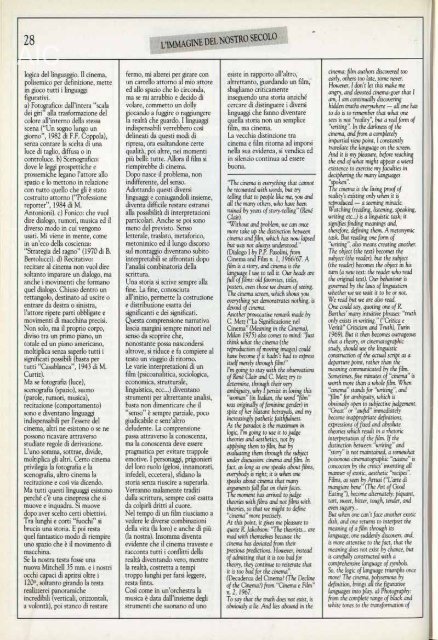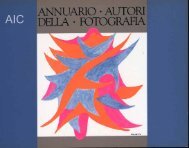AIC, 1988 - AIC Associazione Italiana Autori della Fotografia ...
AIC, 1988 - AIC Associazione Italiana Autori della Fotografia ...
AIC, 1988 - AIC Associazione Italiana Autori della Fotografia ...
You also want an ePaper? Increase the reach of your titles
YUMPU automatically turns print PDFs into web optimized ePapers that Google loves.
<strong>AIC</strong><br />
logica del linguaggio. Il cinema,<br />
polisemico per definizione, mette<br />
in gioco tutti i linguaggi<br />
figurativi.<br />
a) Fotografico: dall'intera "scala<br />
dei giri" alla trasformazione del<br />
colore all'interno <strong>della</strong> stessa<br />
scena ("Un sogno lungo un<br />
giorno", 1982 di F.F. Coppola),<br />
senza contare la scelta di una<br />
luce di taglio, diffusa o in<br />
controluce, b) Scenografico:<br />
dove le leggi prospettiche e<br />
prossemiche legano l'attore allo<br />
spazio e lo mettono in relazione<br />
con tutto quello che gli è stato<br />
costruito attorno ("Professione<br />
reporter", 1984 di M.<br />
Antonioni). c) Fonico: che vuol<br />
dire dialogo, rumori, musica ed il<br />
diverso modo in cui vengono<br />
usati. Mi viene in mente, come<br />
in un'eco <strong>della</strong> coscienza:<br />
"Strategia del ragno" (1970 di B.<br />
Bertolucci), d) Recitativo:<br />
recitare al cinema non vuol dire<br />
soltanto imparare un dialogo, ma<br />
anche i movimenti che formano<br />
quel dialogo. Chiuso dentro un<br />
rettangolo, destinato ad uscire o<br />
entrare da destra o sinistra,<br />
l'attore ripete parti obbligate e<br />
movimenti di macchina precisi.<br />
Non solo, ma il proprio corpo,<br />
diviso tra un primo piano, un<br />
totale ed un piano americano,<br />
moltiplica senza saperlo tutti i<br />
significati possibili (basta per<br />
tutti "Casablanca", 1943 di M.<br />
Curtiz).<br />
Ma se fotografia (luce),<br />
scenografia (spazio), suono<br />
(parole, rumori, musica),<br />
recitazione (comportamento)<br />
sono e diventano linguaggi<br />
indispensabili per l'essere del<br />
cinema, altri ne esistono o se ne<br />
possono ricavare attraverso<br />
studiate regole di derivazione.<br />
L'uno somma, sottrae, divide,<br />
moltiplica gli altri. Certo cinema<br />
privilegia la fotografia e la<br />
scenografia, altro cinema la<br />
recitazione e così via dicendo.<br />
Ma tutti questi linguaggi esistono<br />
perché c'è una cinepresa che si<br />
muove e inquadra. Si muove<br />
dopo aver scelto certi obiettivi.<br />
Tra lunghi e corti "fuochi" si<br />
brucia una storia. E poi resta<br />
quel fantastico modo di riempire<br />
uno spazio che è il movimento di<br />
macchina.<br />
Se la nostra testa fosse una<br />
nuova Mitchell 35 mm. e i nostri<br />
occhi capaci di aprirsi oltre i<br />
120°, soltanto girando la testa<br />
realizzerei panoramiche<br />
incredibili (verticali, orizzontali,<br />
a volontà), poi stanco di restare<br />
fermo, mi alzerei per girare con<br />
un carrello attorno al mio attore<br />
ed allo spazio che lo circonda,<br />
ma se mi arrabbio e decido di<br />
volare, commetto un dolly<br />
giocando a fuggire o raggiungere<br />
la realtà che guardo. I linguaggi<br />
indispensabili verrebbero così<br />
delineati da questi modi di<br />
ripresa, ora esaltandone certe<br />
qualità, poi altre, nei momenti<br />
più belli: tutte. Allora il film si<br />
riempirebbe di cinema.<br />
Dopo nasce il problema, non<br />
indifferente, del senso.<br />
Adottando questi diversi<br />
linguaggi e coniugandoli insieme,<br />
diventa difficile restare estranei<br />
alla possibilità di interpretazioni<br />
particolari. Anche se poi sono<br />
meno del previsto. Senso<br />
letterale, traslato, metaforico,<br />
metonimico ed il lungo discorso<br />
sul montaggio diventano subito<br />
interpretabili se affrontati dopo<br />
l'analisi combinatoria <strong>della</strong><br />
scrittura.<br />
Una storia si scrive sempre alla<br />
fine. La fine, conosciuta<br />
all'inizio, permette la costruzione<br />
e distribuzione esatta dei<br />
significanti e dei significati.<br />
Questa comprensione narrativa<br />
lascia margini sempre minori nel<br />
senso da scoprire che,<br />
nonostante possa nascondersi<br />
altrove, si riduce e fa compiere al<br />
testo un viaggio di ritorno.<br />
Le varie interpretazioni di un<br />
film (psicoanalitica, sociologica,<br />
economica, strutturale,<br />
linguistica, ecc...) diventano<br />
strumenti per altrettante analisi,<br />
basta non dimenticare che il<br />
"senso" è sempre parziale, poco<br />
giudicabile e senz'altro<br />
deludente. La comprensione<br />
passa attraverso la conoscenza,<br />
ma la conoscenza deve essere<br />
pragmatica per evitare trappole<br />
emotive. I personaggi, prigionieri<br />
del loro ruolo (gelosi, innamorati,<br />
infedeli, eccetera), sfidano la<br />
storia senza riuscire a superarla.<br />
Verranno malamente traditi<br />
dalla scrittura, sempre così esatta<br />
da colpirli dritti al cuore.<br />
Nel tempo di un film riusciamo a<br />
vedere le diverse combinazioni<br />
<strong>della</strong> vita (la loro) e anche di più<br />
(la nostra). Insomma diventa<br />
evidente che il cinema traveste e<br />
racconta tutti i conflitti <strong>della</strong><br />
realtà diventando vero, mentre<br />
la realtà, costretta a tempi<br />
troppo lunghi per farsi leggere,<br />
resta finta.<br />
Così come in un'orchestra la<br />
musica è data dall'insieme degli<br />
strumenti che suonano ed uno<br />
esiste in rapporto all'altro,<br />
altrettanto, guardando un film,<br />
sbagliamo criticamente<br />
inseguendo una storia anziché<br />
cercare di distinguere i diversi<br />
linguaggi che fanno diventare<br />
quella storia non un semplice<br />
film, ma cinema.<br />
La vecchia distinzione tra<br />
cinema e film ritorna ad imporsi<br />
nella sua evidenza, si vendica ed<br />
in silenzio continua ad essere<br />
buona.<br />
"The cinema is everything that cannot<br />
be recounted with words, but try<br />
telling that to people like me, you and<br />
all the many others, who have been<br />
ruined by years of story-telling" (René<br />
Clair).<br />
"Without and problem, we can once<br />
more take up the distinction between<br />
cinema and film, which has now lapsed<br />
but was not always understood."<br />
(Dialogo I by P.P. Pasolini, from<br />
Cinema and Film n. 1,1966/67. A<br />
film is a story, and cinema is the<br />
language I use to tell it. Our heads are<br />
full of films: old favorites, titles,<br />
posters, even those we dream of seeing.<br />
The cinema screen, which shows you<br />
everything yet demonstrates nothing, is<br />
devoid of cinema.<br />
Another provocative remark made by<br />
C. Metz ("La Significazione nel<br />
Cinema" (Meaning in the Cinema),<br />
Milan 1975) also comes to mind: "Just<br />
think what the cinema (the<br />
reproduction of moving images) could<br />
have become if it hadn't had to express<br />
itself merely through film!"<br />
I'm going to stay with the observations<br />
of René Clair and C. Met?: try to<br />
determine, through their very<br />
ambiguity, why 1 persist in loving this<br />
"woman" (in Italian, the word "film"<br />
was origiruilly of feminine gender) in<br />
spite of her blatant betrayals, and my<br />
increasingly pathetic faithfulness.<br />
As the paradox is the maximum in<br />
logic, I'm going to use it to judge<br />
theories and aesthetics, not by<br />
applying them to film, but by<br />
evaluating them through the subject<br />
under discussion: cinema and film. In<br />
fact, as long as one speaks about films,<br />
everybody is right; it is when one<br />
speaks about cinema that many<br />
arguments fall flat on their faces.<br />
The moment has arrived to judge<br />
theories with films and not films with<br />
theories, so that we might to define<br />
"cinema" more precisely.<br />
At this point, it gives me pleasure to<br />
quote R. Jakobson: "The theorists... are<br />
mad with themselves because the<br />
cinema has deviated from their<br />
precious predictions. However, instead<br />
of admitting that it is too bad for<br />
theory, they continue to reiterate that<br />
it is too bad for the cinema".<br />
(Decadenza del Cinema? (The Decline<br />
of the Cinema?) from "Cinema e Film"<br />
n 2,1967.<br />
To say that the truth does not exist, is<br />
obviously a lie. And lies abound in the<br />
cinema: film authors discovered too<br />
early, others too late, some never.<br />
However, I don't let this make me<br />
angry, and devoted cinema-goer that 1<br />
am, 1 am continually discovering<br />
hidden truths everywhere — all one has<br />
to do is to remember that what one<br />
sees is not "reality", but a real form of<br />
"writing". In the darkness of the<br />
cinema, and from a completely<br />
impartial view point, 1 constantly<br />
translate the language on the screen.<br />
And it is my pleasure, before reaching<br />
the end of what might appear a wierd<br />
existence to exercise my faculties in<br />
deciphering the many languages<br />
"spoken".<br />
The cinema is the living proof of<br />
reality's existing only when it is<br />
reproduced — a seeming miracle.<br />
Watching (reading, listening, speaking,<br />
writing etc...) is a linguistic task; it<br />
signifies finding meanings and,<br />
therefore, defining them. A metonymic<br />
task. But reading one form of<br />
"writing", also means creating another.<br />
The object (the text) becomes the<br />
subject (the reader), but the subject<br />
(the reader) becomes the object in his<br />
turn (a new text: the reader who read<br />
the original text). Our behaviour is<br />
governed by the laws of linguisticm<br />
whether we we wait it to be or not.<br />
We read but we are also read.<br />
!One could say, quoting one of R.<br />
Barthes' many intuitive phrases: "truth<br />
only exists in writing." ("Critica e<br />
Verità" Criticism and Truth), Turin<br />
1969). But it then becomes outrageous<br />
that a theory, or cinematographic<br />
study, should use the linguistic<br />
construction of the actual script as a<br />
departure point, rather than the<br />
meaning communicated by the film.<br />
Sometimes, five minutes of "cinema" is<br />
worth more than a whole film. When<br />
"cinema" stands for "writing", and<br />
"film" for ambiguity, which is<br />
obviously open to subjective judgement.<br />
"Great" or "awful" immediately<br />
become inappropriate definitions,<br />
expressions of fixed and absolute<br />
theories which result in a rhetoric<br />
interpretation of the film. If the<br />
distinction between "writing" and<br />
"story" is not maintained, a somewhat<br />
poisonous cinematographic "cuisine" is<br />
concocten by the critics' inventing all<br />
manner of exotic, aesthetic "recipes".<br />
Films, as seen by Artusi ("L'arte di<br />
mangiare bene" (The Art of Good<br />
Eating"), become alternately: piquant,<br />
tart, sweet, bitter, tough, tender, and<br />
even sugary...<br />
But when one can't face another exotic<br />
dish, and one returns to interpret the<br />
meaning of a film through its<br />
language, one suddenly discovers, and.<br />
is more attentive to the fact, that the<br />
meaning does not exist by chance, but<br />
is carefully constructed with a<br />
comprehensive language of symbols.<br />
So, the logic of language triumphs once<br />
more! The cinema, polysemous by<br />
definition, brings all the figurative<br />
languages into play, a) Photography:<br />
from the complete range of black and<br />
white tones to the transformation of









